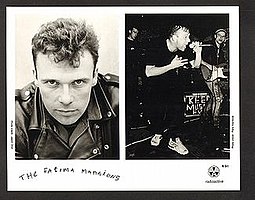The Fatima Mansions: Difference between revisions
→Career: Highlighted a false statement Tags: Mobile edit Mobile app edit Android app edit |
Deleting sentence that is, indeed, no longer accurate. |
||
| Line 38: | Line 38: | ||
They also gained mainstream exposure by opening a European leg of [[U2]]'s [[Zoo TV Tour]] in 1992, although they were nearly booed off the stage and almost started a riot when front man Coughlan swore at a Milan audience and insulted the Pope.<ref name ="Stephenson">Stephenson, Campbell (2004) "[http://observer.guardian.co.uk/omm/the10/story/0,11109,1280949,00.html The 10: Campbell Stevenson on stage disasters]", ''[[The Observer]]'', 15 August 2004, retrieved 10 January 2010</ref> The band often courted controversy with religion, dictators, empires and general authority being targets for Coughlan's vitriol.<ref name="Larkinindie"/> Despite this, ''[[The Guardian]]'' newspaper described him as "the most underrated lyricist in pop today",<ref name="Larkinindie">{{cite book|title=[[Encyclopedia of Popular Music|The Guinness Who’s Who of Indie and New Wave Music]]|editor=[[Colin Larkin (writer)|Colin Larkin]]|publisher=[[Guinness Publishing]]|date=1992|edition=First|isbn=0-85112-579-4|pages=108/9}}</ref> and DJ [[John Peel]] said he could "listen to Cathal Coughlan sing the phone book". |
They also gained mainstream exposure by opening a European leg of [[U2]]'s [[Zoo TV Tour]] in 1992, although they were nearly booed off the stage and almost started a riot when front man Coughlan swore at a Milan audience and insulted the Pope.<ref name ="Stephenson">Stephenson, Campbell (2004) "[http://observer.guardian.co.uk/omm/the10/story/0,11109,1280949,00.html The 10: Campbell Stevenson on stage disasters]", ''[[The Observer]]'', 15 August 2004, retrieved 10 January 2010</ref> The band often courted controversy with religion, dictators, empires and general authority being targets for Coughlan's vitriol.<ref name="Larkinindie"/> Despite this, ''[[The Guardian]]'' newspaper described him as "the most underrated lyricist in pop today",<ref name="Larkinindie">{{cite book|title=[[Encyclopedia of Popular Music|The Guinness Who’s Who of Indie and New Wave Music]]|editor=[[Colin Larkin (writer)|Colin Larkin]]|publisher=[[Guinness Publishing]]|date=1992|edition=First|isbn=0-85112-579-4|pages=108/9}}</ref> and DJ [[John Peel]] said he could "listen to Cathal Coughlan sing the phone book". |
||
The album and singles campaign for 1994's ''Lost in the Former West'' was styled on the glamour of [[Liberace]], and featured a [[cover version]] of [[The Walker Brothers]]'s "Nite Flights" |
The album and singles campaign for 1994's ''Lost in the Former West'' was styled on the glamour of [[Liberace]], and featured a [[cover version]] of [[The Walker Brothers]]'s "Nite Flights". |
||
==Discography== |
==Discography== |
||
Revision as of 01:11, 19 January 2022
The Fatima Mansions | |
|---|---|
 The Fatima Mansions (1991) | |
| Background information | |
| Origin | Cork, Ireland |
| Genres | Art rock |
| Years active | 1988–1995 |
| Labels | Radioactive Records |
| Past members | Cathal Coughlan Andrias O'Gruama Zak Woolhouse Hugh Bunker Nick Allum Nick Bagnall Nick Bunker Jonathan Fell Paul Murphy |
The Fatima Mansions were a rock group formed in 1988 by Cork singer/keyboardist Cathal Coughlan, formerly of Microdisney.[1]
Career
The original line-up consisted of Coughlan, Nick Allum, Jonathan Fell, Zac Woolhouse and Aindrias O'Gruama. They took their name from the Fatima Mansions corporation flats in Rialto, Dublin.[2][3]
The Fatima Mansions were a popular live band, and gained indie chart success with their albums Viva Dead Ponies, Bertie's Brochures, Valhalla Avenue and Lost in the Former West.
They entered the Top 10 of the UK Singles Chart in 1992[4] with a heavily reworked version of Bryan Adams' song "(Everything I Do) I Do It for You", taken from an NME tribute album in aid of the charity, the Spastics Society. The single was a double A-side; the flip-track, Manic Street Preachers' version of "Suicide Is Painless" received most of the radio airplay. They also gained mainstream exposure by opening a European leg of U2's Zoo TV Tour in 1992, although they were nearly booed off the stage and almost started a riot when front man Coughlan swore at a Milan audience and insulted the Pope.[5] The band often courted controversy with religion, dictators, empires and general authority being targets for Coughlan's vitriol.[1] Despite this, The Guardian newspaper described him as "the most underrated lyricist in pop today",[1] and DJ John Peel said he could "listen to Cathal Coughlan sing the phone book".
The album and singles campaign for 1994's Lost in the Former West was styled on the glamour of Liberace, and featured a cover version of The Walker Brothers's "Nite Flights".
Discography
Singles
- "Only Losers Take the Bus" (1989) Kitchenware
- "Blues for Ceausescu" (1990) Kitchenware
- "Hive" E.P. (1991) Kitchenware
- "The Only Solution: Another Revolution" (1991) Radioactive
- "You're a Rose" (1991) Kitchenware/Radioactive
- "Everything I Do (I Do It For You)" (1992) Columbia – IRE No. 12[6]
- "Evil Man" (1992) Kitchenware/Radioactive – UK No. 59[3]
- "1000%" (1992) Kitchenware/Radioactive – UK No. 61[3]
- "Tíma Mansió Dumps the Dead" (1992) Radioactive
- "The Loyaliser" (1994) Kitchenware/Radioactive – UK No. 58[3]
- "Nite Flights" (1994) Kitchenware/Radioactive
Albums
- Against Nature – (1989) – UK Indie No. 12[7]
- Viva Dead Ponies – (1990)
- Bertie's Brochures – (1991)
- Valhalla Avenue – (1992) – UK No. 52[3]
- Come Back My Children – (1992)
- Lost in the Former West – (1994)
- Western Union Steakout – (1994)
References
- ^ a b c Colin Larkin, ed. (1992). The Guinness Who’s Who of Indie and New Wave Music (First ed.). Guinness Publishing. pp. 108/9. ISBN 0-85112-579-4.
- ^ "History of Fatima Mansions Archived 20 October 2008 at the Wayback Machine", Fatima Groups Unlimited, retrieved 10 January 2010
- ^ a b c d e Strong, Martin C. (2003) The Great Indie Discography, Canongate, ISBN 1-84195-335-0, p. 281-282
- ^ Roberts, David (2006). British Hit Singles & Albums (19th ed.). London: Guinness World Records Limited. p. 196. ISBN 1-904994-10-5.
- ^ Stephenson, Campbell (2004) "The 10: Campbell Stevenson on stage disasters", The Observer, 15 August 2004, retrieved 10 January 2010
- ^ Jaclyn Ward. "The Irish Charts – All there is to know". Irishcharts.ie. Retrieved 28 January 2018.
- ^ Lazell, Barry (1998) Indie Hits 1980-1989, Cherry Red Books, ISBN 0-9517206-9-4, p. 85
